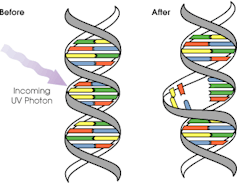Summer is nearly here. But rather than getting out the sunscreen, some TikTokers are urging followers to chuck it out and go sunscreen-free. They claim it’s healthier to forgo sunscreen to get the full benefits of sunshine.
Here’s what science really says.
How does sunscreen work?
Most people with pale to olive skin or other risk factors for skin cancer need to protect themselves. Applying sunscreen is a key method of protecting areas not easily covered by clothes.
Sunscreen works by absorbing or scattering UV rays before they can enter your skin and damage DNA or supportive structures such as collagen. When UV particles hit DNA, the excess energy can damage our DNA. This damage can be repaired, but if the cell divides before the mistake is fixed, it causes a mutation that can lead to skin cancers.
The most common skin cancers are basal cell carcinoma (BCC) and squamous cell carcinoma (SCC). Melanoma is less common, but is the most likely to spread around the body; this process is called metastasis.
Excessive exposure to UV radiation also affects the appearance of your skin. UVA rays are able to penetrate deep into the skin, where they break down supportive structures such as elastin and collagen.
This causes signs of premature ageing, such as deep wrinkling, brown or white blotches, and broken capillaries.
 The energy from a particle of UV (a photon) causes DNA strands to break apart and reconnect incorrectly. This causes a bump in the DNA strand, making it difficult to copy accurately and introducing mutations. NASA/David Herring
The energy from a particle of UV (a photon) causes DNA strands to break apart and reconnect incorrectly. This causes a bump in the DNA strand, making it difficult to copy accurately and introducing mutations. NASA/David Herring
Used consistently, sunscreen reduces your risk of skin cancer and slows skin ageing. In a Queensland (Australia) study, participants either used sunscreen daily for almost five years or continued their usual use. At the end of five years, the daily-use group had reduced their risk of squamous cell carcinoma by 40% compared to the other group. Ten years later, the daily use group had reduced their risk of invasive melanoma by 73%
Does sunscreen block the health-promoting properties of sunlight?
The answer is a bit more complicated and involves personalised risk versus benefit trade-offs.
First, the good news: there are many health benefits of spending time in the sun that don’t rely on exposure to UV radiation and aren’t affected by sunscreen use.
 A person puts sunscreen in front of the Marecottes swimming pool on a hot summer day in the village of Les Marecottes in Valais, Switzerland, 25 June 2019. EPA-EFE/JEAN-CHRISTOPHE BOTT
A person puts sunscreen in front of the Marecottes swimming pool on a hot summer day in the village of Les Marecottes in Valais, Switzerland, 25 June 2019. EPA-EFE/JEAN-CHRISTOPHE BOTT
Sunscreen only filters UV rays, not visible or infrared light (which we feel as heat). And importantly, some of the benefits of sunlight are obtained via the eyes.
Visible light improves mood and regulates circadian rhythm (which influences your sleep-wake cycle), and probably reduces myopia (short-sightedness) in children.
Infrared light is being investigated as a treatment for several skin, neurological, psychiatric and autoimmune disorders.
So what is the benefit of exposing skin to UV radiation?
Exposing the skin to the sun produces vitamin D, which is critical for healthy bones and muscles. Luckily, people who are careful about sun protection can avoid vitamin D deficiency by taking a supplement.
Exposing the skin to UV radiation might have benefits independent of vitamin D production, but these are not proven. It might reduce the risk of autoimmune diseases such as multiple sclerosis or cause the release of a chemical that could reduce blood pressure. However, there is not enough detail about these benefits to know whether sunscreen would be a problem.
What does this mean for you?
There are some benefits of exposing the skin to UV radiation that might be blunted by sunscreen. Whether it’s worth foregoing those benefits to avoid skin cancer depends on how susceptible you are to skin cancer.
If you have pale skin or other factors that increase your risk of skin cancer, you should aim to apply sunscreen daily on all days when the UV index is forecast to reach 3. If you have darker skin that rarely or never burns, you can go without daily sunscreen – although you will still need protection during extended times outdoors.
For now, the balance of evidence suggests it’s better for people who are susceptible to skin cancer to continue with sun protection practices, with vitamin D supplementation if needed.
This story was first published in The Conversation. Katie Lee is a PhD Candidate at the Dermatology Research Centre, The University of Queensland. Rachel Neale is a Principal research fellow at the QIMR Berghofer Medical Research Institute.




 A person puts on sunscreen in front of the Marecottes swimming pool on a hot summer day in the village of Les Marecottes in Valais, Switzerland, 25 June 2019. EPA-EFE/JEAN-CHRISTOPHE BOTT
A person puts on sunscreen in front of the Marecottes swimming pool on a hot summer day in the village of Les Marecottes in Valais, Switzerland, 25 June 2019. EPA-EFE/JEAN-CHRISTOPHE BOTT